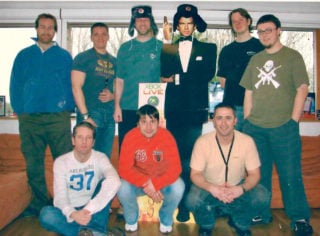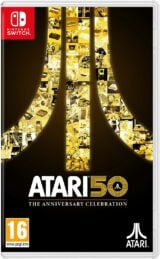It’s time to get serious about game preservation – before it’s too late
Documenting the adventures we have now is so important, before they’re lost to time
Brittany Vincent

A version of this article was first published in 2019. But with the news that PlayStation could soon close PS3, PSP and PS Vita’s digital stores, potentially making hundreds of digital games inaccessible, it seems more appropriate than ever to highlight the issue of game preservation.
It’s easy to assume our favourite games will be around to play forever. When you purchase a title and place it gingerly upon your shelf, you know at the very least you can reach for it at any point in the future, slide it into your disc tray (or cartridge slot), and enjoy a blast of nostalgia. This is generally true of physical media, but hardly ever certain with digital content, which is as ephemeral as gaming gets these days.
In an age where it’s no more painless to preserve a video game for those well-versed in the subject than snapping your fingers, it’s ludicrous to think that there are still titles out there that remain virtually unplayable – and in some cases, lost to the annals of time.
But like it or not, that’s how it is. From satellite broadcasts that accompanied a wide variety of Super Famicom titles to ARGs that were unceremoniously taken out of service, there are an inordinate amount of video games that you simply cannot play any longer.

And as frustrating as it is to think that, with all our technological advances, we’re still forced to see some of the most intriguing video game releases in the medium’s history going down the drain, it’s an unfortunate downside to a medium that often finds large expanses of content forgotten to time.
Perhaps one of the most egregious examples of a video game system that no one will ever be able to experience the way it was meant to be played again is Nintendo’s short-lived Satellaview system.
It’s simple to procure a Satellaview via eBay or a particularly well-stocked retro video game shop. You’re going to need to part with a significant amount of money for one, but it’s possible. You can also purchase accessories and other cartridges needed to work in tandem with the product itself. But you’ll never be able to enjoy the games the exact same way they could be in 1995 ever again.

That’s because the Satellaview was a satellite-powered modem created for the Super Famicom specifically to receive signals broadcast over the air. The Japanese TV station WOWOW’s satellite radio organization St. GIGA regularly hosted data broadcasts that allowed players to hop online and enjoy their favorite game.
A number of games included streaming voice data known as SoundLink, beginning with the inventive BS Zelda no Densetsu, which featured fully voice acted cut scenes – an important first for a Nintendo console. Unlike many of the other Satellaview games, SoundLink titles could only be played during their specific broadcast time.
Live elements such as voice actors expressing urgency and offering directions, a clock, and other aspects that made the games more like audio dramas meant that they were akin to catching your favorite TV show. If you missed out, you’d have to wait until the next broadcast to catch up – though you would have to pick up where everyone else left off, and that could be a massive pain, but it was part of the fun.
This wasn’t always a convenient setup by any means, but it definitely lured players home in front of their TV sets, patiently waiting to play the next installment of their favorite titles, and it got subscriptions paid. Thus, it was an impressive and ingenious idea for the time, and an innovation that we see to a lesser degree now in terms of interactive television and episodic game installments from modern studios.
It’s important to note that some of the Satellaview library isn’t totally unplayable as it stands. Those willing to play emulated versions of the games with newly-recorded English voiceovers and scripting can do so thanks to the power of talented fans and backups, but these are all approximations and translations of how the original Japanese games actually were. They aren’t the “real deal,” especially if you don’t speak Japanese.
So while these titles can be accessed and explored, even played to completion, they’re still offering a facsimile of what the Super Famicom did back in the ’90s. This doesn’t include the entirety of the Satellaview’s library, however, or every single broadcast. The only real way to experience those broadcasts again would be if Nintendo ever decided to make them available – and that’s very unlikely to happen.
In 2001, Electronic Arts pressed forward with a valiant attempt at enveloping players in a realistic alternate reality game called Majestic. In a strange attempt at transcending the virtual world, it leaned on real-world methods of communication like AOL Instant Messenger and even phone calls to further immerse players in its bizarre world.
Based on a shadowy fictional organization rooted in the world of Majestic 12 conspiracy theories, it spanned five episodes that played out over a “season,” a release schedule that tends to mirror this early concept.
The game was a commercial failure, but it managed to win PC Gamer‘s 2001 “Most Innovative” prize, lauding the concepts the publication’s staff felt would be “rekindled in the future.” It’s gone largely unrecognized over the years, but for good reason – it’s totally and completely unplayable.
Even if you purchase a copy of the game, which you still can, there’s no way to access the first “season’s” playable content. Players were required to join EA.com’s Platinum Service, which cost $9.95 per month, and when EA discontinued the service entirely in 2002, the communications behind keeping the ARG afloat presumably went down the drain, too.
So the servers are long since dead, AIM was shuttered in 2017, and there’s no reliable way to access the game’s original subscription-based content. Unless some prescient fan thought to document every single email, fax, phone call, or instant message they received while playing through Majestic, that content has simply been lost to time. And even if it hadn’t been, there’s no way to experience that flurry of updates as you would have when the game debuted in 2001.
Majestic suffered a cruel fate, indeed. Was it an uninspired attempt at realistic drama? Are we better off for having not played it? Many of us will never really have any way of knowing, beyond what those who were around to experience it at the time had to say – and that truth certainly does sting.
Sometimes, the reason for a game’s disappearance has nothing to do with outdated technology or services. Unfortunately, some titles evaporate into thin air because they’re simply delisted from the online storefronts that originally hosted them. Case in point: Scott Pilgrim vs. The World: The Game.
“Should we steel ourselves and prepare to accept the eventuality that any title we love could eventually become unavailable in its current state? It doesn’t have to.”
The fantastic side-scrolling beat-’em’-up was only available digitally on the PlayStation 3 and Xbox One from 2010 to 2014. But once the Scott Pilgrim property’s license expired, it meant that developer Ubisoft Montreal was no longer able to make money from the game – so players could not download it and enjoy it again [Editor’s note: the game was made available again in 2021.]
Some modern games have taken the idea of the unplayable game and woven it into a concept that they’ve actually embraced. Developer RobotLovesKitty introduced the idea of “true” permadeath with their hybrid game show and dungeon crawler Upsilon Circuit.
After coming to the realization that permadeath usually has no consequences beyond stripping players of their gear or favorite character, they decided to put the “permanence” in permadeath, as they divulged to Polygon in a 2014 interview.
Upsilon Circuit took place in an enormous world on a single server, with a maximum of eight people logged in at once. Out of the eight, only one player was actually playing. It may sound like any other streamable dungeon exploration game, but there was one huge catch: you only got one chance to play.
If that chance were squandered, or the player died early on during their time with the game, that was it. Upsilon Circuit gave no second chances and did not forgive transgressions.

As a result, it remains unplayable. It’s an interesting concept to lean into, especially when unplayability is often foisted on players in an unsavory manner. So while the game existed, you couldn’t enjoy it again the same way you did the first time – much like many of the other games that have been lost to time.
What becomes of the unplayable games doomed to become nothing but a blip in the medium’s history? Should we steel ourselves and prepare to accept the eventuality that any title we love could eventually become unavailable in its current state? It doesn’t have to.
Game preservation, by way of purchasing hard copies of the titles you love, and documenting the adventures we have now is so important.
The medium is priceless – and while many of us were careless in its infancy, there’s no real excuse these days not to archive every bit of the art form we’ve come to cherish, not with high fidelity capture cards, the ability to scan items and documents directly from our phones, and literal 3D printers.
If we don’t want to see additional games lost to the sands of time, it’s time to start getting serious about preservation – before it’s too late.
















